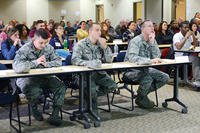Thinking about going back to school but worried military life might get in the way?
Good news for you: Being a military spouse can actually make some parts of going back to school easier, especially when it comes to paying for a program. Here's what you need to know about military spouse education help.
MyCAA
If you're looking for a two-year degree, MyCAA is the best place for you to start. MyCAA is a tuition assistance tool that covers job-related training, education and licensing for spouses of active-duty service members. Your service member needs to be within ranks E1-E6, W1-W-2 and O1-O3, including National Guard and Reserve spouses whose sponsors are on Title 10 orders.
Two-year degrees offer more job potential than you might think. Here are 10 awesome (and well-paying) jobs you can get with an associate's degree, all of which you should be able to find wherever you're stationed. How's that for a win?
Post 9/11 GI Bill
If you are married to a more senior service member, you won't qualify for MyCAA funding. Also, if you want to earn a bachelor's degree or graduate degree, MyCAA won't pay. But don't let that dash your hopes -- your military benefits may still enable you to pursue your academic dreams.
Your spouse’s GI Bill benefits may be available for transfer to you for use toward your education. But be warned: This option isn't for everybody. Your service member will have had to serve for at least six years and must be committed to the military for at least four more. There are also some new, tightened restrictions about who qualifies for transferability and how long they have to make those transfer decisions.
Extra Tuition Assistance
Some branches even make additional education funding available for spouses, and many spouses' clubs run scholarship programs that may be able to help.
More and more colleges and universities are offering discounted programs for military, veterans and their families. A fantastic example is Syracuse University's Veterans Career Transition Program. Not only can you take classes that can lead to actual licensing, but you can also get the soft skills you will need for a job search, too. All remotely, from wherever you are.
If you're looking for scholarships to help ease the burden of tuition, make use this scholarship finder from Fastweb to help make ends meet.
Make School Easier
Once you're in school, you may find that you are even able to get credit for some of the work you've already done by taking exams to place out of the class. This can help lower the cost of your education and may help you speed through your degree more quickly.
If near an installation, you should also be able to access childcare resources to help make sure your family is taken care of while you take your education to the next level. Eligibility for placement at the Child Development Centers varies widely from base to base, so make sure you get in touch with your CDC early to find out the details. (Many have waitlists, so you'll want to make sure you're completely in the know!)
Depending on your career path, you may find that licensing and certification is in your future. While navigating licensure requirements from state-to-state isn't easy, it is absolutely doable. Make sure you check out our guide to licensing for military spouses before you get started.
Going back to school is an adventure -- one your whole family will take with you. But don't let military life deter you. If anything, let the resources available to you as a military spouse help launch you into your next phase with higher education.
Keep Up with the Ins and Outs of Military Life
For the latest military news and tips on military family benefits and more, subscribe to Military.com and have the information you need delivered directly to your inbox.






















